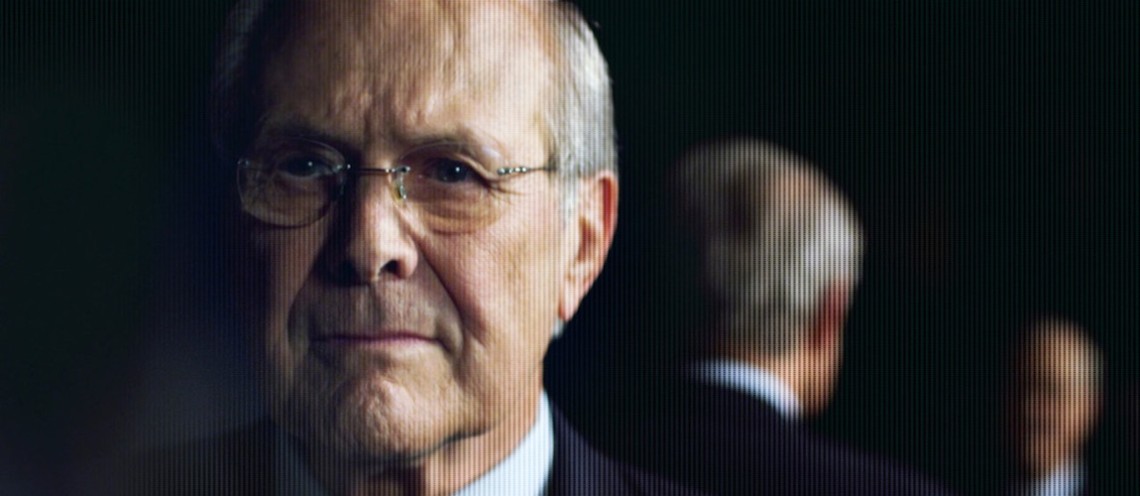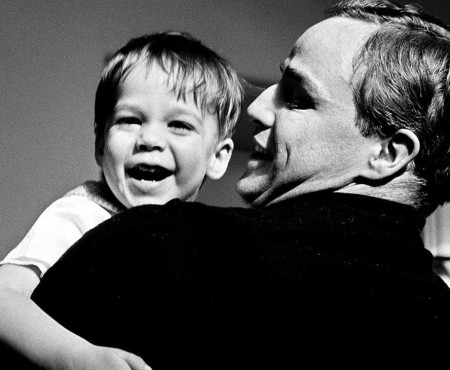Since it’s a new Errol Morris documentary, I expected that The Unknown Known would be good. And it is. What I didn’t expect is that the film works as an effective companion piece to The Act of Killing. Both docs follow subjects who are complicit in mass death, but the arcs that those subjects follow could not be more different. Anwar Congo killed with his bare hands, while Donald Rumsfeld killed with sociopathic policymaking. Congo recognizes that he is a killer, while Rumsfeld denies his responsibility. The making of the film about him forces Congo to come to some brief moments of empathy and self-awareness about his monstrosity, while Rumsfeld seems to have experienced not even the slightest discomfort over the course of his time before the Interrotron.
In fact, Rumsfeld is a far scarier individual than Anwar Congo. He’s a master of doublespeak, capable of obfuscating reality in order to fit whatever agenda he wants to push. Anyone who paid attention during his tenure as Secretary of Defense in the Bush years is wearily familiar with this, and The Unknown Known is, among other things, a dispiriting revisiting of those times. The main focus of the film is the machinations that led to the War in Iraq, and the fallout as everyone gradually realized that we’d been duped about weapons of mass destruction. The narrative oscillates between that time period and important moments from Rumsfeld’s long career in politics, clearly demonstrating his stunning inability to learn anything from Vietnam, or any other event, except perhaps how to lie better.
The “known knowns” statement is Rumsfeld’s most infamous piece of verbal guile, and the title of the film refers to the one combination of “knowns” and “unknowns” that he left out in that press conference. He spoke of “known knowns” (what we know that we know), “known unknowns” (what we know we don’t know), and “unknown unknowns” (what we are unaware of), but not “unknown knowns.”
Slavoj Žižek pointed out that these would be things that we know but refuse to acknowledge, which ties in to Rumsfeld quite well. In one scene, he relates how when he took over as White House Chief of Staff for Gerald Ford he discovered a safe left in the office by his predecessor, Alexander Haig. He had the safe removed without the slightest curiosity as to its contents. The key to deceiving others is to first deceive oneself, and what better way to do that than maintaining deliberate ignorance?
A general rule of drama is that characters must change, but The Unknown Known remains riveting despite its main character’s stubborn refusal to experience even a moment of self-reflection. Rumsfeld likely viewed this film as nothing more than a long-form interview, perhaps a good way to get “his side” of the story out. But in Morris’s hands, it becomes a soliloquy on truth and how we filter and twist it so that it’s more comfortable to us, which is one of the filmmaker’s favorite themes. Watching Rumsfeld is perturbingly captivating.
He’s an architect of the modern military-industrial complex, but he has the candor of a fit grandfather. Time and time again, he makes stunningly unfunny statements and puts on a huge shit-eating grin, expecting an appreciative laugh. It’s a clear and infuriating sign that he’s spent too much time among yes-men. He’s emblematic of what In the Loop so aptly called the “boring psycho,” the measured, friendly bureaucrat who rains death through the stroke of a pen without a second thought.
During his decades in politics, Rumsfeld produced tens of thousands of memos, so many that he calls them “the snowflakes.” Even he acknowledges how an overwhelming amount of information can make the truth so difficult to see. This is a man who made a career out of shaking the snow globe. A good deal of The Unknown Known feels like Morris retreading The Fog of War, but it’s nonetheless a great film.





















One thought on “AFI Fest Review: ‘The Unknown Known’”
Pingback: The 2014 Cinematic Retrospectivus